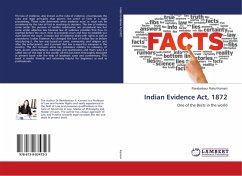The law of evidence, also known as the rules of evidence, encompasses the rules and legal principles that govern the proof of facts in a legal proceeding. These rules determine what evidence must or must not be considered by the trier of fact in reaching its decision. The law of evidence come under the purview of neither substantive nor procedural law but come under adjective law because law of evidence provides that how to reached before the court, how to proceeds court and how to establish our claim before the court. it means law of evidence deals with rights as well as procedures. Indian Evidence Act changed the face of Indian law as before introducing it, the law was based on caste, community, and religion and after the enforcement, and it proved that law is equal for everyone in the country. The Act contains some key provisions relating to relevancy of facts, proof, presumptions, witnesses and examination and that's why it is called one of the best in the world! All this hasbeen thoroughly discussed in present book with the help of landmark cases and commentary. This book is reader friendly and extremely helpful for beginners as well as professionals.
Bitte wählen Sie Ihr Anliegen aus.
Rechnungen
Retourenschein anfordern
Bestellstatus
Storno








